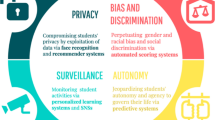Abstract
Although artificial intelligence (AI) is becoming increasingly important in the media environment (search engines, chatbots, home assistants, recommendation systems, etc.), the general audiences’ knowledge of it remains limited, which biases their representations. To compensate for this, some governments show an interest in teaching it from an early age. It appears that educational resources related to AI literacy in schools are most often focused on technical skills. However, the challenges of such education are also ethical and societal, requiring an interdisciplinary and critical approach. This research aims at developing a 10–14 years old curriculum questioning the concept of intelligence in AI systems, and crossing computer science education and media literacy education. Through a role-playing game, the children discover the basic concepts of machine learning. Beyond their initial representations, which they become aware that they are largely fueled by the media, they can realize that an AI system is the result of design choices and that it only works within the framework that has been defined for it. Moreover, the possibility for teachers to teach the curriculum themselves in their classes is also evaluated. To this end, the curriculum was taught to 60 future trainee teachers, 70 middle school pupils, and 12 elementary pupils. Interviews were conducted also with 5 teachers who had either observed the curriculum taught by a researcher or attempted to teach it themselves. The results show that the children’s representations have evolved towards representations that are more technically correct (although incomplete), but not very oriented towards aspects that open up critical questioning. The difficulties revealed in the implementation of the critical part are due in particular to the complexity of the IT concepts to be addressed, but also to the lack of teacher training. However, the data collected seems to confirm the interest and feasibility of crossing different disciplinary approaches to address certain aspects of AI. In conclusion, in addition to the curriculum, this paper describes a theoretical model of critical citizenship education in technology that integrates approaches to computer science education and media literacy education, and gives avenues for other designers and researchers to create AI critical educational experiences for K-12 learners.


Similar content being viewed by others
Notes
https://www.declarationmontreal-iaresponsable.com/la-declaration, last visited January 15, 2021.
Available, in French, on the School-IT website: https://school-it.info.unamur.be/les-activites/intelligence-artificielle/.
References
Anderson T, Shattuck J (2012) Design-based research: a decade of progress in education research? Educational Researcher, 41:16–25. Retrieved from http://edr.sagepub.com/content/41/1/7.full.pdf+html. Accessed 15 Jan 2021
Barab S, Squire K (2004) Design-based research: putting a stake in the ground. J Learn Sci 13(1):1–14
Boraita F, Henry J, Collard A-S (2020) Developing a critical robot literacy for young people from conceptual metaphors analysis. In: Proceedings of the 2020 IEEE frontiers in education conference (FIE). IEEE
Cobb P, Confrey J, DiSessa A, Lehrer R, Schauble L (2003) Design experiments in educational research. Educ Res 32(1):9–13
Collard A-S, Jacques J (2018) Eduquer aux robots: les enjeux de la métaphore du vivant. Actes du Séminaire M@rsouin 2018. Retreived from https://www.marsouin.org/article1089.html. Accessed 15Jan 2021
Collective T.D.-B.R. (2003) Design-based research: an emerging paradigm for educational inquiry. Educ Res 32(1):5–8
De la Higuera C (2015) À l’école, doit-on enseigner l’informatique ou le coding ? Retrieved from http://www.slate.fr/story/110897/ecole-enseigner-informatique-coding. Accessed 15 Jan 2021
Druga S, Williams R, Breazeal C, Resnick M (2017) Hey Google is it OK if I eat you? Initial explorations in child-agent interaction. In: Proceedings of the 2017 ACM conference on interaction design and children (IDC). ACM, pp 595–600
Druga S, Williams R, Park HW, Breazeal C (2018) How smart are the smart toys? Children and parents’ agent interaction and intelligence attribution. In: Proceedings of the 2018 ACM conference on interaction design and children (IDC). ACM, pp 231–240
Eaton E, Koenig S, Schulz C, Maurelli F, Lee J, Eckroth J, Crowley J, Freedman RG, Rivera REC, Machado T et al (2018) Blue sky ideas in artificial intelligence education from the EAAI 2017 new and future AI educator program. AI Matters 3(4):23–31
Elish MC, Boyd D (2018) Situating methods in the magic of big data and AI. Commun Monogr 85(1):57–80
Fastrez P (2011) Quelles compétences le concept de littératie médiatique englobe-t-il ? une proposition de définition matricielle. Rech Commun 33(33):35–52
Gadanidis G (2017) Artificial intelligence, computational thinking, and mathematics education. Int J Inf Learn Technol 34(2):133–139
Glaser BG, Strauss AL (1967) The discovery of grounded theory: strategies for qualitative research. Aldine, Chicago
Heinze C, Haase J, Higgins H (2010) An action research report from a multiyear approach to teaching artificial intelligence at the K6 level. In: The 1st symposium on educational advances in artificial intelligence (EAAI), 2010
Henry J, Hernalesteen A, Dumas B, Collard A-S (2018) Que signifie éduquer au numérique ? Pour une approche interdisciplinaire. In: De 0 à 1 ou l’heure de l’informatique à l’école: Actes du colloque Didapro 7 - DidaSTIC. Peter lang, pp 61–82
Henry J, Hernalesteen A, Collard A-S (2020) Designing digital literacy activities: an interdisciplinary and collaborative approach. In: Proceedings of the 2020 IEEE Frontiers in Education Conference (FIE). IEEE
Kandlhofer M, Steinbauer G, Hirschmugl-Gaisch S, Huber P (2016) Artificial intelligence and computer science in education: from kindergarten to university. In: Proceedings od the 2016 IEEE Frontiers in Education Conference (FIE). IEEE, pp 1–9
Latour B (2000) La fin des moyens. Réseaux 18(100):39–58
Lejeune C (2019) Manuel d’analyse qualitative: Analyser sans compter ni classer (2ème édition). De Boeck Supérieur
Long D, Magerko B (2020) What is AI literacy? Competencies and design considerations. In: Proceedings of the 2020 ACM conference on human factors in computing systems (CHI). ACM, pp 1–16
McKenney S, Reeves TC (2013) Systematic review of design-based research progress: is a little knowledge a dangerous thing? Educ Res 42(2):97–100
Payne BH (2020) Can my algorithm be my opinion?: an AI+ ethics curriculum for middle school students. Doctoral dissertation, Massachusetts Institute of Technology
Saariketo M (2014) Imagining alternative agency in techno-society: outlining the basis of critical technology education. In: Media practice and everyday agency in Europe. édition lumière, pp 129–113
Saariketo M (2014) Reflections on the question of technology in media literacy education. In: Reflections on media education futures: contributions to the Conference Media Education Futures in Tampere, Finland, pp 51–61
Sabuncuoglu A (2020) Designing one year curriculum to teach artificial intelligence for middle school. In: Proceedings of the 2020 ACM conference on innovation and technology in computer science education. ACM, pp 96–102
Touretzky D, Gardner-McCune C, Martin F, Seehorn D (2019) Envisioning AI for K-12: what should every child know about AI? In: Proceedings of the AAAI Conference on artificial intelligence, Vol. 33:9795–9799
Van Brummelen J, Heng T, Tabunshchyk V (2020) Teaching tech to talk: K-12 conversational artificial intelligence literacy curriculum and development tools. arXiv preprint arXiv:2009.05653
Vartiainen H, Tedre M, Valtonen T (2020) Learning machine learning with very young children: who is teaching whom? Int J Child-Comput Interacyt 25:100182
Vartiainen H, Toivonen T, Jormanainen I, Kahila J, Tedre M, Valtonen T (2020) Machine learning for middle-schoolers: children as designers of machine learning apps. In: Proceedings of the 2020 IEEE Frontiers in Education Conference (FIE). IEEE, pp 1–9
Villani C (2018) Donner un sens à l’intelligence artificielle. In: Mission Villani sur l'intelligence artificielle, 2018, Yann Bonnet, Secrétaire général du Conseil national du numérique, 978-2-11-145708-9
Voogt J, Roblin NP (2012) A comparative analysis of international frameworks for 21st century competences: implications for national curriculum policies. J Curric Stud 44(3):299–321
Vuorikari R, Punie Y, Gomez SC, Van Den Brande G (2016) Digcomp 2.0 : the digital competence framework for citizens. In: Update phase 1: the conceptual reference model. EUR 27948 EN. Office of the European Union, Luxembourg, JRC101254
Wang F, Hannafin MJ (2005) Design-based research and technology-enhanced learning environments. Educ Technol Res Dev 53(4):5–23. https://doi.org/10.1007/BF02504682 ((last visited January 15, 2021))
Zhou X, Van Brummelen J, Lin P (2020) Designing AI learning experiences for K-12: emerging works, future opportunities and a design framework. arXiv preprint arXiv:2009.10228
Author information
Authors and Affiliations
Author notes
Julie Henry, Alyson Hernalesteen and Anne-Sophie Collard have contributed equally to this work.
Corresponding author
Rights and permissions
About this article
Cite this article
Henry, J., Hernalesteen, A. & Collard, AS. Teaching Artificial Intelligence to K-12 Through a Role-Playing Game Questioning the Intelligence Concept. Künstl Intell 35, 171–179 (2021). https://doi.org/10.1007/s13218-021-00733-7
Received:
Accepted:
Published:
Issue Date:
DOI: https://doi.org/10.1007/s13218-021-00733-7




